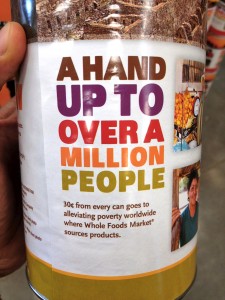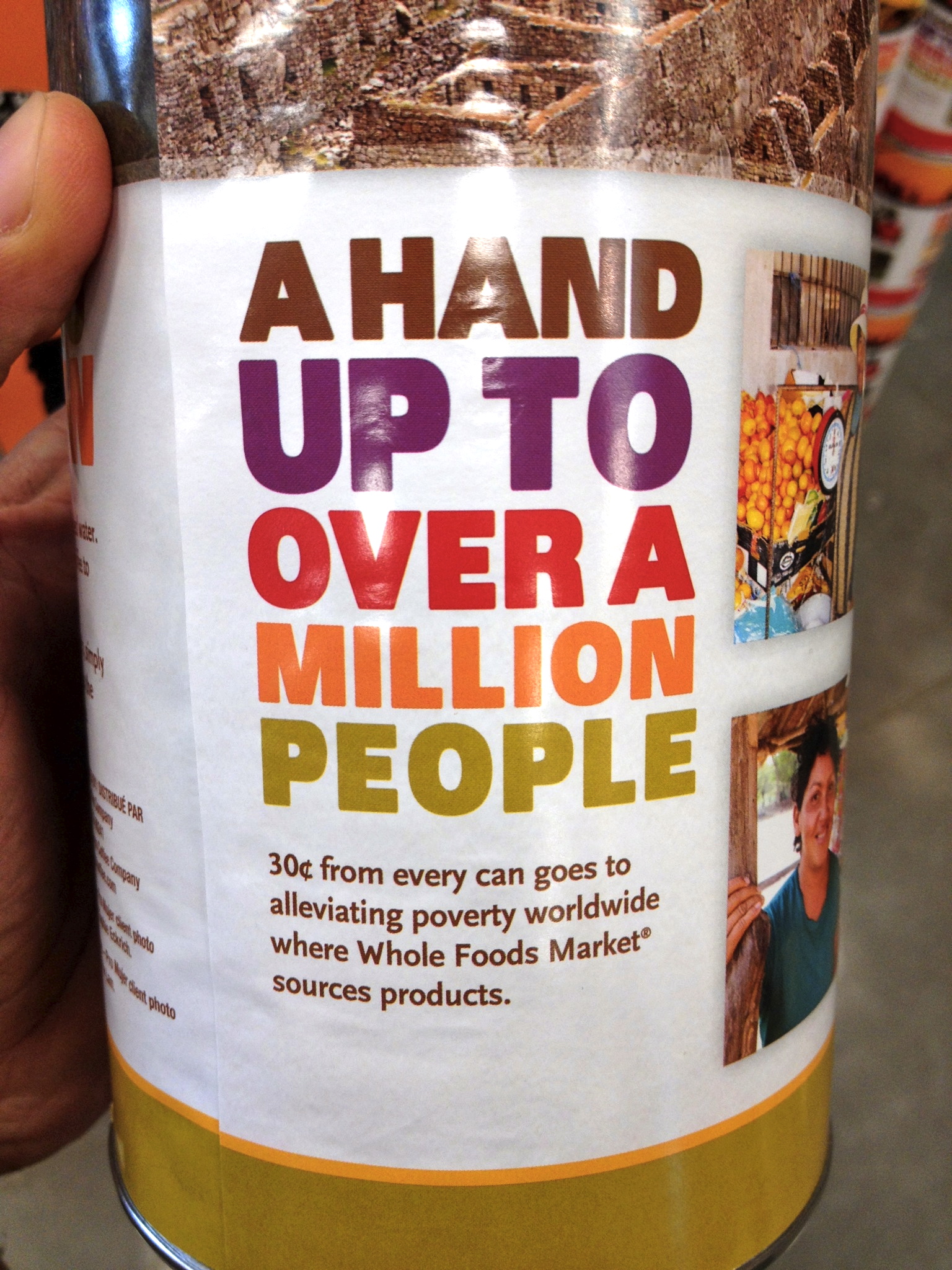
While shopping at Whole Foods last week (yeah, I do that often #smirking) I came across a new Whole Foods brand coffee. It was arranged in a pyramid styled display, and the store rep., having just completed the task of assembling it, stood nearby staring on with a look so proud it bordered on the supercilious.
I stepped closer to observe that the coffee was being shipped in from all around the world: Latin America, East Africa, India blends. Of course this is nothing new, we always bring in goods from places we’ve either colonized or helped facilitated the colonization of (think Vietnam). But what struck me most was what I read on the side of the container: “A hand up to over a million people. 30¢ from every can goes to alleviating poverty worldwide where Whole Foods Market sources products.”
Hmmm… “A hand up,” “alleviating poverty worldwide.” Really?
There are two immediate ways in which I might problematize the crisis in Western altruistic thought — and the capitalist work of Whole Foods in this endeavor:
First, it positions us, as Westerners who live in and with a “First World” perception, to imagine that essential poverty can be alleviated by 30¢. And what a bargain that is! In fact, it’s a 2 for 1 special, because not only can one purchase a can of fresh, organic, fairly traded coffee, but one can also purchase one’s redemption from having to think or be concerned about the constructed impoverished conditions of the people who laboriously tend this coffee on land they don’t own, or even control. One need not expend cognitive energy contemplating the worker’s labor conditions, which are likely politically influenced by social and economic mandates from one’s own First World government; just 30¢ and it all goes away.
Pardon me a moment while I run to my bookshelf, grab my bible and reread the parable of the Good Samaritan:
[Luke 10: 30-37]
29But he, willing to justify himself, said unto Jesus, And who is my neighbour?
30And Jesus answering said, A certain man went down from Jerusalem to Jericho, and fell among thieves, which stripped him of his raiment, and wounded him, and departed, leaving him half dead.
31And by chance there came down a certain priest that way: and when he saw him, he passed by on the other side.
32And likewise a Levite, when he was at the place, came and looked on him, and passed by on the other side.
33But a certain Samaritan, as he journeyed, came where he was: and when he saw him, he had compassion on him,
34And went to him, and bound up his wounds, pouring in oil and wine, and set him on his own beast, and brought him to an inn, and took care of him.
35And on the morrow when he departed, he took out two pence, and gave them to the host, and said unto him, Take care of him; and whatsoever thou spendest more, when I come again, I will repay thee.
36Which now of these three, thinkest thou, was neighbour unto him that fell among the thieves?
37And he said, He that shewed mercy on him. Then said Jesus unto him, Go, and do thou likewise. [KJV]
The marketing formation of this coffee creates a way for western consumers to escape critiques of capitalism. Rather than fundamentally question this economic monolith, we choose, instead, to tolerate it; and Whole Foods makes it a benign affair. In many ways that which we call “neocolonialism” is merely the refitting of the old colonialism to a contemporary world and political cultural order. The labor of those othered is still exploited, but said exploitation is somehow in the very same moment alleviated — and that apparently with 30¢.
Real photographs of the women on the side of the can have simply become twenty-first century iconographs of acceptable indigence. Think “Aunt Jamima,” still clothed in her class-status-cueing raiment, still brandishing a smile of contentment, only now she is receiving a so-called fair wage.
Next, when we consider the example of Africa we know that it was a continental European colonial outpost. And we know that the economic corruption and deleterious identity politics were introduced by morally challenged European powers and are sustained by African hegemons. American media and educational structuring silence this past and present in such a way that it is held external to the lived experiences of both Third World laborers and First World consumers. Capitalist frameworks of knowledge exploitation, and our participation in its perpetuation, are obscured by an altruistic desire to purchase our 30¢ redemption from having to care any further about the way in which neocolonialism cashes in on, as Jesus would assert, our neighbor.
Though we think ourselves “Good Samaritans”, in fact we have become political actors, “Levites” and “priests,” at the register in Whole Foods. No coming closer out of compassionate concern, no oil and wine of healing or bandaging of wounds, no picking up from the road side and transporting to the inn, no financing of medical care to nurse back to health; nothing of a sorts. Just 30¢ to alleviate the poverty. Oh, the suffering worker will remain in poverty, no doubt! But it will be somewhat alleviated as the oppressive economic relationship of our’s and our neighbor’s world is authorized by this insidious transaction of misdirection. The irony of the issue at hand is not that we didn’t provide a charitable service, but that we got to walk away imagining that we did. And this is, as Slavoj Zizek would say, “the commodification of suffering,” where the aim is not to end the economic relationship hinged on disparate power, rather it is to maintain it by benevolently prolonging it as though one were giving alms.
“The proper aim is to try and reconstruct society on such a basis that poverty will be impossible.” -Zizek


Deprecated: Function get_magic_quotes_gpc() is deprecated in /hermes/bosnacweb08/bosnacweb08bf/b1577/ipg.rifuturecom/RIFutureNew/wp-includes/formatting.php on line 4387
Deprecated: Function get_magic_quotes_gpc() is deprecated in /hermes/bosnacweb08/bosnacweb08bf/b1577/ipg.rifuturecom/RIFutureNew/wp-includes/formatting.php on line 4387
Deprecated: Function get_magic_quotes_gpc() is deprecated in /hermes/bosnacweb08/bosnacweb08bf/b1577/ipg.rifuturecom/RIFutureNew/wp-includes/formatting.php on line 4387